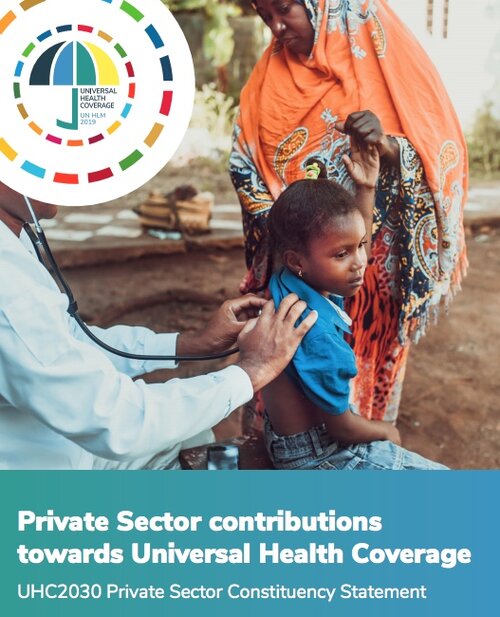UHC2030 hosted its annual UHC Day parliamentarian town hall to...
21 September 2019
The UHC2030 Private Sector Constituency has launched its statement on ‘Private Sector contributions towards universal health coverage'.

Ahead of the UN High-Level Meeting on UHC, the launch of the Private Sector Constituency Statement on UHC is an exciting example of how different stakeholders can contribute to efforts towards UHC. The private sector already plays an important role as it provides health products and services for many millions of people and communities globally. The statement highlights how the private sector can work together with other stakeholders to achieve better health and well-being for all people at all ages.
“It is essential to reframe public and private sector engagement as a partnership for shared outcomes. This statement provides a helpful basis for dialogue to promote shared UHC goals,” said Peter Salama, Executive Director UHC/Life Course at the World Health Organization.
Most countries have mixed (public and private) health systems, and the for-profit private sector provides over 60% of health services in some countries. The statement recognises the enabling environment needed for private sector contributions, and the roles of government stewardship and public financing in ensuring availability, accessibility, acceptability and quality of service delivery across both public and private sectors.
“To achieve UHC, it is critical to ensure strong cooperation and partnership between public and private sectors,” said Dr Zwelini Mkhize, Minister of Health, South Africa.
“The private sector constituency statement is very welcome as it makes a strong call for government’s stewardship role. Governments need to strengthen their national health strategy and regulate the health sector, including engagement with the private sector, in order to make progress towards UHC,” said Dr Isabella Maina, Head of the division of Healthcare Financing, Ministry of Health, Kenya,
How can the private sector contribute to UHC?
In the spirit of multi-stakeholder partnership, the Private Sector Constituency Statement for UHC builds on the Sustainable Development Goals, the UHC2030 Global Compact, and the ‘Key Asks from the UHC Movement’. It reinforces the five key principles for collective action in the UHC2030 Global Compact, which are endorsed by all members of UHC2030, as the basis to guide collaboration across all partners including the private sector:
- Leave no one behind
- Transparency and accountability for results
- Evidence-based national health strategies and leadership
- Making health everyone’s business
- International cooperation based on mutual learning across countries.
The statement outlines seven ways in which the private sector can contribute to UHC. The UHC2030 Private Sector Constituency will promote enhanced action across the private sector to:
- Continue to offer high-quality products and services, and make these affordable, accessible and sustainable
- Incorporate UHC principles, including to leave no one behind, in core business models and objectives and in any philanthropic activities
- Develop, test and scale up innovative business models
- Create, adapt, apply and scale up innovations
- Help strengthen the health workforce
- Contribute to efforts to raise the finance available for UHC
- Engage in, champion, and build capacities for relevant policy dialogue and partnerships with government and other stakeholders
“This UHC2030 Private Sector Constituency commitment to overarching UHC principles of affordability, quality and equity in accessing essential health services is imperative. We in the World Bank Group are committed to working together with governments and private sector to help realize this commitment on the ground, including in the most deprived and areas affected by conflict and fragility,” said Muhammad Ali Pate, Global Director, Health, Nutrition and Population Global Practice of the World Bank and the Director of Global Financing Facility for Women, Children and Adolescents.
About the UHC2030 Private Sector Constituency
The UHC2030 Private Sector Constituency, hosted by the World Economic Forum, convenes private sector actors and fosters dialogue and collaboration across the private sector and with other UHC2030 partners, constituencies and networks. Members are for-profit entities within the health value chain such as service providers, health insurers, and manufacturers and distributors of medicines, health products and innovative technologies.
“The private sector is vital in efforts towards UHC. It is exciting to see the diverse membership of UHC2030’s Private Sector Constituency agree these common principles and actions. This statement is an important step towards joint action with other stakeholders to maximise the private sector’s contributions to UHC,” said Dr Githinji Gitahi, MBS, Group CEO Amref Health Africa and Co-Chair of UHC2030.
Next steps: moving together for UHC
The Key Asks from the UHC Movement for the United Nations High-Level Meeting on UHC include a call to engage the whole of society for a healthier world. The Private Sector Constituency statement reflects inputs from other UHC2030 partners such as civil society, governments and international organisations, and sets out principles, values and actions that the Private Sector Constituency will champion. It provides a basis for further dialogue with all UHC stakeholders to promote mutual understanding, a shared vision, and collaborative action for how the private sector can most effectively contribute to UHC.
"While it is the obligation of national governments to protect and realize the right to health for all, in many countries the private sector plays a significant role in the direct provision of health services, supply of essential medicines and equipment, and even health financing. The launch of the UHC2030 Private-Sector Constituency and this statement of commitment to equity and non-discrimination, transparency and accountability and multi-stakeholder engagement is a step forward in improving the private sector's role in contributing to public good," said Justin Koonin, Civil Society Engagement Mechanism for UHC2030 (CSEM).
Read more about the UHC2030 Private Sector Constituency
(including a list of current members of the UHC2030 Private Sector Constituency)
UHC2030 Private Sector Constituency Statement on UHC
More UHC2030 News
A global health financing emergency threatens progress toward...
UHC2030 at HSR2024: Advancing equity and inclusion in health systems through civil society knowledge
UHC2030, in collaboration with the SUPPORT-SYSTEMS research...
